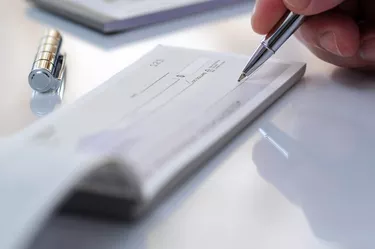
If you are a Canadian resident, you may have seen the letters "FPT" in your banking transactions, or perhaps "Canada FTP" or "Fed-Prov/Ter." This is an abbreviation that stands for "Federal-Provincial/Territorial" and it means that the payment in your bank account is from the Canadian government. This could be from a number of different programs.
FPT Codes and Payments From the Canadian Government
Video of the Day
FPT is a bank code that identifies the source of the funds as the Canadian government. Banks use codes to identify the originating institution of payments, often including not just a reference to the overall bank but a code for the specific branch, if applicable. Canada Buzz explains that "FPT," "Canada FPT" and "Fed-Prov/Ter" are the three most common codes that refer to direct deposit payments from the Canadian government related to a number of tax and social programs.
Video of the Day
Direct deposit payments from these programs may sometimes have a different bank code that refers to the specific originating program, but frequently any kind of direct deposit from the Canadian government simply has the FPT code. These payments include refunds, tax credits and, during the pandemic, stimulus and small business program payments. Understanding what programs you are eligible for will help you identify the source or cause of payments marked FPT.
Canadian Benefit Programs Marked FPT
The FPT code most commonly shows up on direct deposits related to the Canada Child Benefit (CCB) or Universal Child Care Benefit (UCCB), the federal goods and services tax/harmonized sales tax (GST/HST) credit, the Canada Recovery Benefit (CRB) or the BC climate action tax credit or carbon tax rebate. This will depend on your province and eligibility.
Per the Canadian government website, the Canada Child Benefit helps eligible families – generally those with lower incomes – pay for the cost of raising children under 18 years of age. This benefit is non-taxable and may include additional money for the child disability benefit. It is paid monthly, generally around the 20th of the month.
The GST/HST credit is a program for families with low and modest incomes that refunds a certain amount of purchased goods' and services' tax/harmonized sales tax. It is non-taxable and is deposited quarterly, in January, April, July and October. While in most cases, this FPT deposit is automatic (based on your income tax returns), the amount varies depending on your marital status, family net income and number of children in the family. For 2021, an unmarried person could receive up to $456 and a married person (or one with a common-law partner) could receive up to $598. There is an additional $157 credit per child under the age of 19. In addition, the BC climate action tax credit or carbon tax rebate are credits that help offset carbon taxes and may be combined with GST/HST FPT payouts.
Finally, an FPT payment may be related to the Canada Recovery Benefit. If the deposit is exactly $900 or $540, this is the likely source. The CRB supports employed or self-employed people affected by COVID-19 who are not eligible for employment insurance benefits. However, this benefit is taxed. The actual amount of the benefit is $1,000 or $600, but these are taxed at a 10 percent rate, resulting in FPT payments of $900 or $540, respectively. These are for a two-week period.